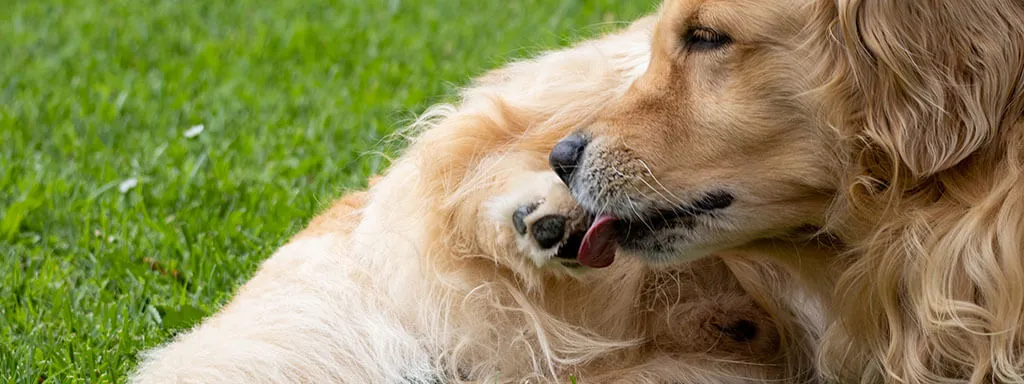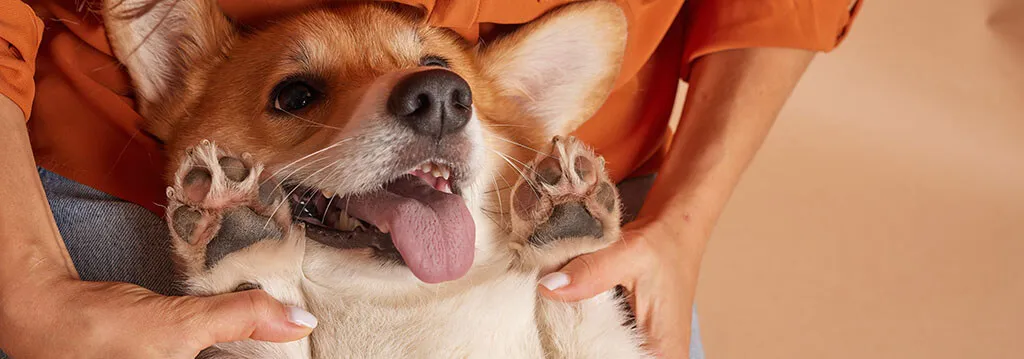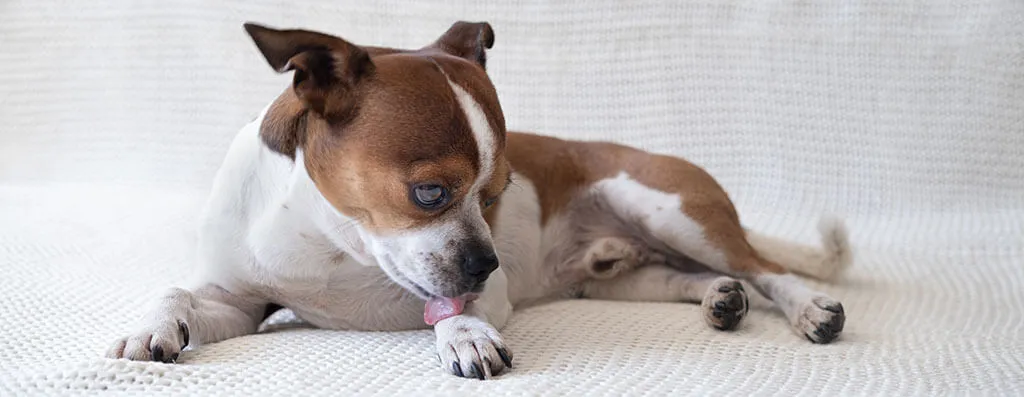Noticing your dog constantly licking or chewing her paws can be a concerning behavior for any pet parent. While occasional paw grooming is a normal part of canine behavior, an obsessive or persistent habit often signals an underlying issue that needs attention. Dogs frequently lick and bite their paws, targeting both the nails and the sensitive pads underneath. Understanding why your dog won’t stop chewing her paws is the first step toward finding an effective solution and ensuring her comfort.
There are numerous reasons why a dog might engage in excessive paw chewing, ranging from minor irritations like dry skin to more complex issues such as separation anxiety in old dogs or specific health conditions. This guide will explore the most common causes behind this behavior and provide actionable steps to help your furry friend.
Why Your Dog Won’t Stop Chewing Her Paws
When your dog won’t stop chewing her paws, it’s a clear indication that something is bothering her. This section delves into the various reasons behind this persistent behavior, from environmental factors to health concerns, helping you identify what might be affecting your beloved pet.
Stress and Anxiety
Just like humans have nervous habits, dogs too exhibit stress releases, such as picking at their fur or biting nails. Your dog is no different. When puppies are young, their mothers often lick them to soothe and care for them. This ingrained behavior can manifest in adult dogs as self-soothing through paw licking and chewing when they feel anxious or uncertain. If your dog won’t stop chewing her paws, it could be her way of trying to relax and unwind, but for you, as her owner, it’s a vital sign that she might be experiencing occasional stress or deeper anxiety.
Occasional Allergies
One of the most common reasons your dog won’t stop chewing her paws is allergies. Your pup could be battling seasonal allergies triggered by environmental factors like pollen or grass, especially if the chewing increases after walks outdoors. However, if excessive licking occurs regardless of outdoor activity, a food allergy could be the culprit. Common dietary allergens include beef, chicken, dairy products, and certain grains. Observing if there’s a correlation between specific foods and increased paw chewing can help identify the trigger.
Additionally, household cleaning products can sometimes irritate a dog’s paws, leading to discomfort and chewing. Changing your cleaning supplies might alleviate the issue. If you suspect allergies are the cause but can’t pinpoint the trigger, consulting your veterinarian for allergy management recommendations is crucial.
 A Golden Retriever lying on a grassy lawn, licking its front paw.
A Golden Retriever lying on a grassy lawn, licking its front paw.
Dry Skin
Persistent paw chewing might be as simple as dry skin. If you’ve noticed flakes of skin or a generally dry appearance on your dog’s coat, her paw pads are likely also affected. Dog paws are as sensitive as the skin underneath their fur, so dry, irritated pads can lead to intense discomfort. Over-bathing or excessive grooming can strip natural oils from your dog’s skin and fur, contributing to dryness. Reducing the frequency of baths and exploring alternative ways to keep your dog fresh might help alleviate this issue.
Injury or Pain
If your dog keeps chewing on her paws more than usual, it’s essential to consider the possibility of pain or discomfort. A common cause is an injury to the paw, such as stepping on a sharp object, a cut, or a thorn. Your dog might lick or chew in an attempt to dislodge a foreign object or soothe the pain. If she’s unable to remove it, constant chewing can lead to raw, irritated paws.
Beyond external injuries, older dogs might be experiencing internal issues like joint pain or arthritis. Dogs suffering from chronic joint conditions often resort to licking or biting their paws to alleviate discomfort. If your dog won’t stop chewing her paws, especially if she’s older, investigating potential arthritis or other underlying conditions is important. Australian cattle dog behavior problems can sometimes include behavioral responses to pain, making vigilance key.
Monitor the frequency of paw biting and licking. Look for swelling, redness, or signs of trauma. If you find no obvious injury, a veterinary consultation is crucial to assess for injuries, joint issues, or other sources of pain. Early intervention is vital for preventing further damage and ensuring your dog’s comfort. For pain-related licking, your veterinarian may recommend pain medications or anti-inflammatories, and in some cases, an e-collar or bandage to prevent further chewing during healing.
Grooming
Dogs naturally groom themselves. After a walk or playtime outdoors, you might notice your dog giving her paws a quick lick. This is a normal part of self-cleaning, as dogs cannot “wash their hands” like humans. They use their tongues to remove dirt or debris. You might also observe gentle gnawing as they give their paws some tender loving care. This type of self-grooming is usually not a cause for concern. However, you can assist this process by wiping down your pup’s paws with a towel or grooming wipes after she comes inside, removing any potential irritants.
Parasites
If your dog enjoys time outdoors, she’s susceptible to parasites like ticks or fleas. If a tick attaches itself to her paw, or if she has a flea infestation, the resulting itch and irritation can cause her to constantly chew her paws. She will try to scratch, lick, or bite the affected area to remove the parasite and soothe the discomfort.
Regularly check your dog for fleas and ticks, especially after outdoor excursions. Implementing a year-round flea and tick prevention regimen is essential to keep these bothersome parasites from irritating your pet’s paws and causing her to chew them.
Boredom
Sometimes, the reason your dog won’t stop chewing her paws boils down to simple boredom. Similar to how stress and anxiety can trigger paw licking, boredom can lead to restlessness and irritability, increasing anxious behaviors. When dogs are bored, they may seek an outlet for their energy, and chewing their paws can become a self-stimulating activity.
As a responsible pet parent, it’s your job to ensure your dog receives adequate physical and mental exercise. Make sure she meets her daily activity requirements to prevent restless behavior and keep stress levels low. Engaging her with brain games or interactive toys, especially on days when outdoor activities are limited, can significantly reduce boredom and the associated paw chewing.
 A close-up of a happy Corgi lying on its back, paws up in the air, with its tongue out and mouth open, looking playful and excited.
A close-up of a happy Corgi lying on its back, paws up in the air, with its tongue out and mouth open, looking playful and excited.
Paw Infections
A persistent paw chewing habit can often signal a paw infection. Yeast and other fungal infections are common in dogs, thriving in warm, moist areas like between their paw pads. If a yeast infection develops, you may notice your dog chewing on paws or constantly licking them to relieve the intense itch and discomfort. The affected area might appear red, swollen, or emit a distinct, often cheesy odor. Bacterial infections, usually stemming from a small cut or wound that becomes infected, can present similar symptoms. If left untreated, these infections can worsen, leading to excessive paw chewing and greater discomfort.
If your dog is chewing her paws a lot and you suspect an infection, seeking veterinary advice is crucial. Your veterinarian may prescribe topical or oral treatments, such as medicated wipes or sprays, to combat the infection, soothe irritation, and prevent further chewing.
Paw Burns
If your dog has recently walked on hot pavement or rough surfaces, paw burns could be why she won’t stop chewing her paws. A dog’s sensitive paw pads can get severely burned from exposure to hot asphalt or sand, particularly during warmer months. These burns cause immense pain, leading your dog to lick or bite her paws excessively in an attempt to soothe the raw sensation. The affected area might appear red, blistered, or even peeled. Prompt treatment is essential to prevent infections or long-term damage.
To prevent paw burns, avoid walking your dog during the hottest parts of the day, and always check the surface temperature with your hand before heading out. If your dog suffers a burn, gently clean the area and apply a vet-approved burn cream. For severe cases, your veterinarian might recommend bandaging the paws and using an e-collar to prevent further chewing while the pads heal.
Nail Problems
Nail problems are another frequent cause for your dog chewing her paws excessively. Overgrown, cracked, or ingrown nails can cause significant discomfort, prompting your dog to try and relieve the pain through licking or chewing. When your dog keeps biting her paws, it could indicate a painful nail condition. Ingrown nails can press into the paw pad, while cracked or broken nails expose sensitive tissue, causing irritation and prompting excessive chewing.
Regular nail trimming can prevent many of these issues. However, if you notice signs of nail damage or discomfort, consult your veterinarian for proper treatment. Simple trims or protective bandages might suffice, but more severe cases could require medications or specialized care to resolve the issue, helping your dog stop chewing her paws and maintain healthy nails.
When to Worry About Dog Paw Licking and Chewing
While occasional paw grooming is normal, it’s critical to pay close attention if your dog is licking or chewing her paws excessively, especially if the behavior is new or intensifying. Persistent chewing, particularly when accompanied by symptoms like limping, visible redness, swelling, bleeding, or if your dog constantly chews her paws raw, indicates a more serious underlying issue. This could be anything from allergies and infections to injuries or even deep-seated pain.
If you observe your dog chewing her paws a lot, along with any swelling, redness, visible sores, or changes in her gait, it’s time to seek immediate veterinary attention. A veterinarian can accurately diagnose the cause, whether it’s an allergy, an infection, or another condition, and recommend appropriate remedies to stop your dog from paw chewing. Ignoring these symptoms can lead to severe complications, such as secondary infections from constant licking or significant damage to the skin and paw pads.
In severe cases, excessive paw chewing might be a sign of intense pain or discomfort requiring prompt intervention. A thorough veterinary examination will help determine the root cause and provide the most effective course of treatment. Early intervention is key to preventing long-term damage and ensuring your dog’s overall well-being.
 A small brown and white dog, possibly a Chihuahua mix, lying on a white blanket, licking its paw.
A small brown and white dog, possibly a Chihuahua mix, lying on a white blanket, licking its paw.
Remedies for Dog Paw Licking and Chewing
When your dog won’t stop chewing her paws, finding effective remedies is crucial for her comfort and health. Both veterinary-recommended treatments and supportive home remedies can help manage and reduce this behavior.
Veterinary Treatments for Paw Licking and Chewing
If your dog keeps chewing her paws, a visit to the veterinarian is essential to pinpoint the underlying cause. The treatment plan will depend largely on the diagnosis.
- Topical Antifungal Creams: If a fungal infection is identified as the reason your dog is chewing her paws, your veterinarian may prescribe a topical antifungal cream to eliminate the fungus and reduce irritation.
- Antibiotics for Bacterial Infections: For bacterial infections, antibiotics will be prescribed to clear up the infection. This is particularly important if your dog is chewing her paws raw or has open sores.
- Allergy Medications: If allergies are causing your dog to chew her paws excessively, your veterinarian might prescribe antihistamines, corticosteroids, or other medications to manage the allergic reaction, reduce inflammation, and alleviate itching.
- Pain Medications: For dogs showing signs of discomfort or injury, such as limping, pain relievers may be prescribed to ease discomfort and prevent excessive paw chewing. Canine behavior training near me can also sometimes help address behavioral responses to chronic pain, alongside medical intervention.
- Paw Wrapping or Bandages: In cases of burns, cuts, or other injuries, your veterinarian may recommend wrapping the paws with bandages to protect them during healing. An Elizabethan collar (e-collar) may also be suggested to prevent further licking or chewing while the paw recovers.
- Dietary Changes: If a food allergy or intolerance is suspected, your veterinarian may suggest an elimination diet or switching to hypoallergenic dog food to identify and remove the dietary trigger causing the excessive chewing.
Home Remedies for Paw Licking and Chewing
While professional veterinary care is paramount for diagnosing and treating the root cause of excessive paw chewing, several home remedies and supportive measures can help manage the issue.
- Paw Soaks: Soaking your dog’s paws in lukewarm water with Epsom salt can help reduce inflammation and soothe irritated paws. For dogs with allergies or sensitive skin, an oatmeal bath can also provide relief.
- Dog Booties: Using dog booties can protect your dog’s paws from environmental irritants such as allergens, hot pavement, or rough surfaces, thereby preventing her from chewing due to discomfort.
- Bitter Sprays: Pet-safe bitter sprays can be applied to your dog’s paws to discourage chewing. These sprays have an unpleasant taste that helps curb the behavior. However, it’s crucial to address the underlying cause rather than relying solely on this method.
- Keep Paws Clean: Regularly washing and inspecting your dog’s paws helps prevent irritants from causing chewing. Removing dirt, pollen, or debris after walks can significantly reduce the need for your dog to chew her paws excessively. Stop a dog from chewing on shoes addresses a similar behavioral chewing issue, and consistency in cleaning and prevention applies across various chewing habits.
Always consult your veterinarian before trying any home remedies to ensure they are safe and appropriate for your dog’s specific condition.
How to Keep Your Dog’s Paws Healthy
Maintaining your dog’s paw health is paramount to preventing issues like excessive paw chewing. By following a few simple preventative measures, you can help your dog avoid discomfort and keep her paws in excellent condition.
Keep Paw Hair Short and Free of Matting
Regularly trimming the hair around your dog’s paw pads helps prevent matting, which can trap debris, moisture, and irritants, leading to discomfort. This simple grooming step can significantly reduce your dog’s urge to constantly chew her paws.
Trim Nails Regularly
Keeping your dog’s nails properly trimmed prevents overgrowth, which can cause discomfort, pain, and even injury. Overgrown nails can alter your dog’s gait, putting extra pressure on the paws and leading to paw chewing or biting as she tries to relieve the pressure.
Wipe and Dry Paws Regularly
After walks, especially in muddy or wet conditions, thoroughly wipe your dog’s paws with a damp cloth and ensure they are completely dry. This practice helps remove irritants like dirt, pollen, chemicals, or allergens that can trigger paw chewing. For dogs prone to chewing their paws a lot, regular cleaning can make a significant difference.
Parasite Prevention
Ensure your dog is on a consistent and reliable parasite prevention regimen. Fleas, ticks, and other parasites cause intense itching and discomfort, often leading to excessive paw chewing. Preventing these parasites is a fundamental step in keeping your dog comfortable and her paws healthy.
Avoid Hot Asphalt and Rough Surfaces
During warmer months, always avoid walking your dog on hot pavement or asphalt, as these surfaces can cause severe burns to their sensitive paw pads. Similarly, rough surfaces like gravel can irritate paws. Whenever possible, stick to softer surfaces like grass to prevent injuries that may cause your dog to start chewing her paws.
Support Gut Health
A healthy gut is intrinsically linked to overall well-being, including skin and coat health. By supporting your dog’s digestive system with a balanced diet and appropriate supplements, you can help prevent certain skin conditions or allergies that might lead her to excessively lick or chew her paws.
By being proactive and consistently maintaining your dog’s paw health, you can significantly reduce behaviors like constant paw chewing, ensuring your dog remains comfortable, happy, and healthy.
Happy Paws for a Happy Pup
When your dog won’t stop chewing her paws, it’s a clear sign she needs your help. As a caring pet parent, it’s essential to investigate the cause and take appropriate action. While some conditions will undoubtedly require a visit to your veterinarian, many issues can be addressed through home remedies, preventative care, and consistent attention. Implementing these changes in your daily routine can make a profound difference in your pup’s life, leading to happier, healthier paws and an overall more content companion.
